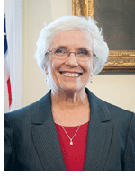Jehlen: How to Keep Seniors with Memory Impairments Safe
– State Senator Patricia Jehlen, Second Middlesex District
 The fear of a loved one wandering or becoming lost is a frightening thought for anyone who cares for a person with Alzheimer’s disease, dementia or other memory impairments.
The fear of a loved one wandering or becoming lost is a frightening thought for anyone who cares for a person with Alzheimer’s disease, dementia or other memory impairments.
In light of recent events, I want to share some information about Silver Alert, a community response system that alerts public and private safety departments when an adult with serious memory impairment is reported missing.
The latest Silver Alert in Somerville thankfully resulted in a happy ending when the missing person was found safely after being gone for over 24 hours. The sad reality, however, is that not all situations end so happily. Approximately 6 in 10 dementia victims will wander at least once. If not found within 24 hours, up to half of wandering seniors with dementia suffer serious injury or death. Because of these statistics, it is important that the entire community be aware of what to look out for when a Silver Alert is in effect.
The Silver Alert, a priority of the Alzheimer’s Association, was signed into law in 2010, mandating that adults with dementia be treated as a missing person regardless of how long they have been missing. They are now required to be treated as high-risk and responded to by the police department of the community where they were last seen. The missing person is promptly entered into the National Crime Information Center (NCIC) database and reported to the Massachusetts Missing Persons Clearinghouse which, when requested, will send an alert to appropriate public and private safety agencies.
The Alzheimer’s Association provides tips for how to handle these situations in their video titled “The Silver Alert†on YouTube (http://www.youtube.com/watch?v=8-QDFQg1n90). It is important for the caregiver to do a thorough search of where the missing person was last seen, to ensure that they have, in fact, gone missing. When reporting a person missing the more details the better, such as what they were wearing, common places they may go, relatives, friends or social clubs close by, and their most common mode of transportation such as a bus or subway line.
The video also provides clues for the public to watch for when a person is missing. The missing person may seem confused or lost, they will have difficulty judging safety and risks and may wander into traffic unknowingly. They may seem anxious, afraid to move, or act erratically and may seek inappropriate shelter such as in shrubbery or the woods. When approaching a person who seems disoriented and lost, remember that they will take cues from you, so try to act calm and reassuring. Most of the time the missing person will only wander within a ½ mile radius, so a perimeter will be set for the search.
There are also many technologies that can help in the search of a missing person. Technologies like GPS, email, phone alerts and personal locator devices are helpful to authorities in their search.
If you are a caregiver or family member of a person who suffers from Alzheimer’s or dementia there are a few tips to prevent your loved one from wandering or becoming lost. Since forms of dementia can cause visual impairment, it helps to install a slide bolt lock on doors out of the normal range of vision. You could disguise exits with drapes or hang a bell by the door so that it will ring as it opens and closes. Placing a black mat in front of exit doors can also be used a temporary measure to prevent wandering. There are many helpful technologies such as video monitors and other monitoring devices that could prove useful.
As with any potential crisis, education and planning are key to prevention. Rather than risking the well-being of a loved one, learn what tools and resources are available to you and to them in order to understand what measures can be taken both before and during an event in which someone wanders. Contact Alzheimer’s Association (http://www.alz.org/) and local law enforcement for information and events related to wandering and Silver Alert.